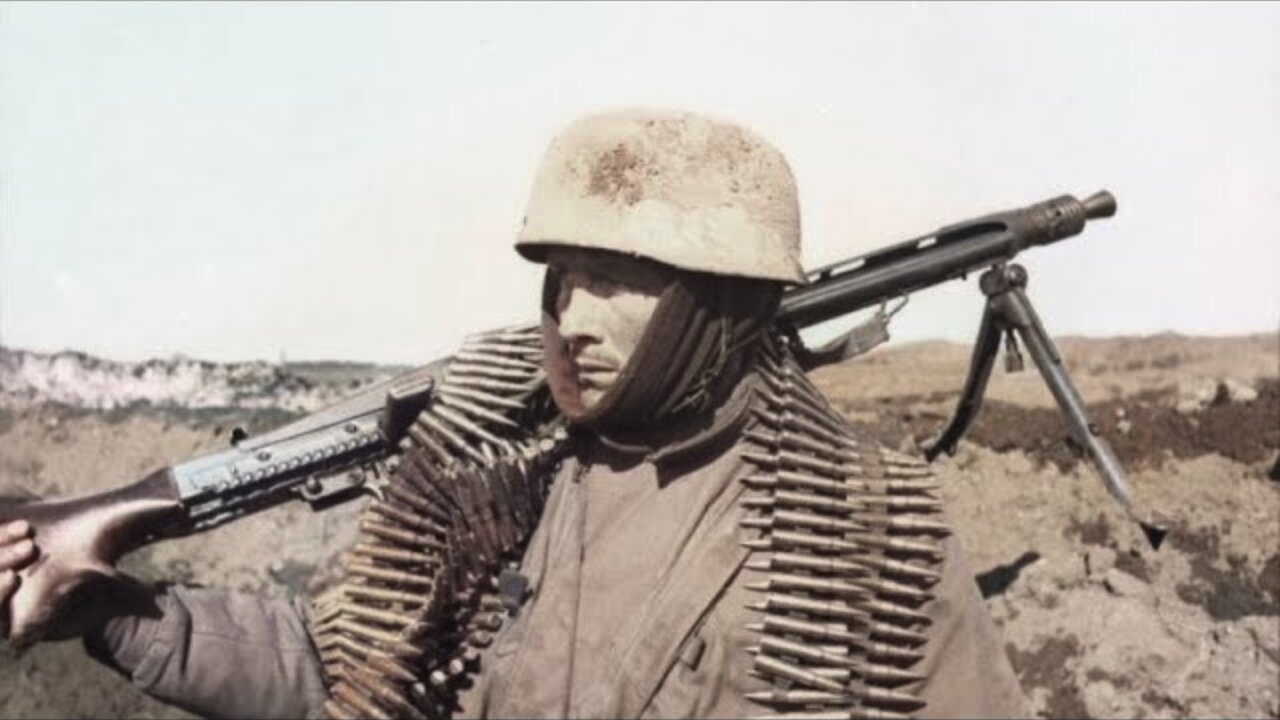Premium Only Content

MERCURY, German invasion of Crete, A 1943 US EVALUATION of the operation + German film footage
🔥PREVIEW ALL YOUTUBE VIDEOS
www.Patreon.com/Military1945
Episode 255
Be sure to give this video a THUMBS UP! Best way to support the channel!
SUBSCRIBE to M1945
ORIGINALS for sale...
https://www.militaria1945.com
The Battle of Crete, codenamed Operation Mercury (German: Unternehmen Merkur), was a major Axis airborne and amphibious operation during World War II to capture the island of Crete. It began on the morning of 20 May 1941, with multiple German airborne landings on Crete. Greek and other Allied forces, along with Cretan civilians, defended the island. After only one day of fighting, the Germans had suffered heavy casualties and the Allied troops were confident that they would defeat the invasion. The next day, through communication failures, Allied tactical hesitation, and German offensive operations, Maleme Airfield in western Crete fell, enabling the Germans to land reinforcements and overwhelm the defensive positions on the north of the island. Allied forces withdrew to the south coast. More than half were evacuated by the British Royal Navy and the remainder surrendered or joined the Cretan resistance. The defence of Crete evolved into a costly naval engagement; by the end of the campaign the Royal Navy's eastern Mediterranean strength had been reduced to only two battleships and three cruisers.
The Battle of Crete was the first occasion where Fallschirmjäger (German paratroops) were used en masse, the first mainly airborne invasion in military history, the first time the Allies made significant use of intelligence from decrypted German messages from the Enigma machine, and the first time German troops encountered mass resistance from a civilian population.[15] Due to the number of casualties and the belief that airborne forces no longer had the advantage of surprise, Adolf Hitler became reluctant to authorize further large airborne operations, preferring instead to employ paratroopers as ground troops. In contrast, the Allies were impressed by the potential of paratroopers and started to form airborne-assault and airfield-defense regiments.
British forces had initially garrisoned Crete when the Italians attacked Greece on 28 October 1940, enabling the Greek government to employ the Fifth Cretan Division in the mainland campaign. This arrangement suited the British: Crete could provide the Royal Navy with excellent harbours in the eastern Mediterranean, from which it could threaten the Axis south-eastern flank, and the Ploiești oil fields in Romania would be within range of British bombers based on the island.
The Italians were repulsed, but the subsequent German invasion of April 1941 (Operation Marita), succeeded in overrunning mainland Greece. At the end of the month, 57,000 Allied troops were evacuated by the Royal Navy. Some were sent to Crete to bolster its garrison until fresh forces could be organised, although most had lost their heavy equipment. Winston Churchill, the British prime minister, sent a telegram to the Chief of the Imperial General Staff, General Sir John Dill: "To lose Crete because we had not sufficient bulk of forces there would be a crime."
The German Army High Command (Oberkommando des Heeres, OKH) was preoccupied with Operation Barbarossa, the invasion of the Soviet Union, and was largely opposed to a German attack on Crete. However, Hitler remained concerned about attacks in other theatres, in particular on his Romanian fuel supply,[18] and Luftwaffe commanders were enthusiastic about the idea of seizing Crete by a daring airborne attack. The desire to regain prestige after their defeat by the Royal Air Force (RAF) in the Battle of Britain the year before, may also have played a role in their thinking, especially before the advent of the much more important invasion of the Soviet Union. Hitler was won over by the audacious proposal and in Directive 31 he asserted that "Crete... will be the operational base from which to carry on the air war in the Eastern Mediterranean, in co-ordination with the situation in North Africa." The directive also stated that the operation was to be in May and must not be allowed to interfere with the planned campaign against the Soviet Union. Before the invasion, the Germans conducted a bombing campaign to establish air superiority and forced the RAF to move its remaining aeroplanes to Alexandria in Egypt.
-
 8:03
8:03
Military1945
1 day agoLatvian Waffen SS 1944 MG 34, Basic Training Manual, German Oath of Allegiance,, Weimar Republic
84 -
 2:12:58
2:12:58
Robert Gouveia
10 hours agoSenator's Wife EXPOSED! Special Counsel ATTACKS; AP News BLOWN OUT
97.4K61 -
 55:07
55:07
LFA TV
1 day agoDefending the Indefensible | TRUMPET DAILY 2.25.25 7PM
33.7K14 -
 6:09:26
6:09:26
Barry Cunningham
16 hours agoTRUMP DAILY BRIEFING - WATCH WHITE HOUSE PRESS CONFERENCE LIVE! EXECUTIVE ORDERS AND MORE!
146K50 -
 1:46:37
1:46:37
Game On!
11 hours ago $7.12 earnedPUMP THE BRAKES! Checking Today's Sports Betting Lines!
51.6K3 -
 1:27:21
1:27:21
Redacted News
11 hours agoBREAKING! SOMETHING BIG IS HAPPENING AT THE CIA AND FBI RIGHT NOW, AS KASH PATEL CLEANS HOUSE
198K277 -
 1:08:28
1:08:28
In The Litter Box w/ Jewels & Catturd
1 day agoCrenshaw Threatens Tucker | In the Litter Box w/ Jewels & Catturd – Ep. 749 – 2/25/2025
116K57 -
 44:57
44:57
Standpoint with Gabe Groisman
1 day agoWill Byron Donalds Run for Florida Governor? With Congressman Byron Donalds
60.8K9 -
 1:06:25
1:06:25
Savanah Hernandez
10 hours agoEXPOSED: FBI destroys evidence as NSA’s LGBTQ sex chats get leaked?!
91.4K30 -
 1:59:58
1:59:58
Revenge of the Cis
12 hours agoEpisode 1452: Hindsight
76.4K11